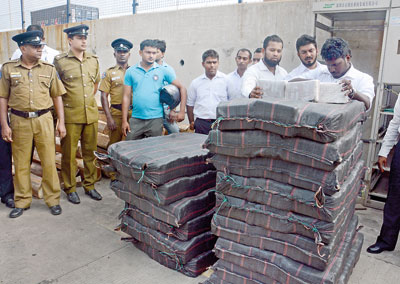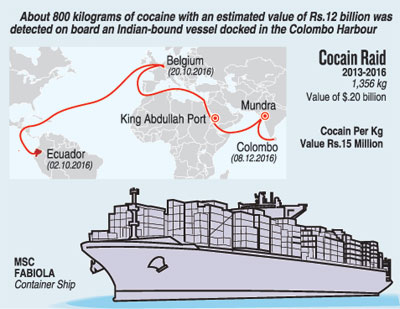News
Regular cocaine detections make SL an ‘unpopular’ transit point
View(s):By Damith Wickremasekara
Regular raids leading to detection of large cocaine hauls is expected to slow down the use of Sri Lanka as a transit point for drug trafficking, said a senior Police official involved in Narcotics detection.

The haul of 800 kg of cocaine that was detected in the raid onboard the vessel Fabiola. Pic by Gayan Amarasekera
He said that, though large stocks of cocaine were detected in recent months, the contraband was Europe bound, according to investigations.
The vessel ‚ÄėFabiola‚Äô which had sailed from Ecuador on October 2, and called at ports in Belgium, India and Saudi Arabia, had arrived in Colombo on Thursday, prior to heading to an Indian port.
A haul of 800 kg of cocaine was detected in the raid, raising the total of cocaine detection to more than 1,300 kg since 2013. The estimated street value of Thursday’s detection was Rs 12 billion, while the total street value of the detections made during the past three years is Rs 20 billion.
The ship in which the latest detection was made, was carrying a consignment of teak to a company in India, which information our customs officials will be sharing with their Indian counterparts.  The officer said frequent raids were conducted after months of surveillance on suspicious vessels from the country of origin.
“These raids will discourage attempts at using Sri Lanka as a transit point. One of the reasons that Sri Lanka is used is to prevent persons from becoming suspicious, unlike when vessels come from countries noted for drug trafficking,” the officer explained.
The officer said that, since the special investigations unit of the Police Narcotics was set up, they monitor ships of selected countries including Brazil, India, Pakistan, Australia, Malaysia, Singapore, Indonesia and African countries.
He said they have set up a separate operation unit to monitor ships arriving in Sri Lanka, and with the information available on suspicious ships, they were able to obtain court orders to conduct searches.
“There are periods of increased drug production when they are shipped out. We are aware of their usual business movements,” he said.
“Our objective is to buck the trend, so that, they stop using Sri Lanka as a transit point,” he said.
He said they believe that there were local agents connected with the trade and were keeping a close eye on those involved.


